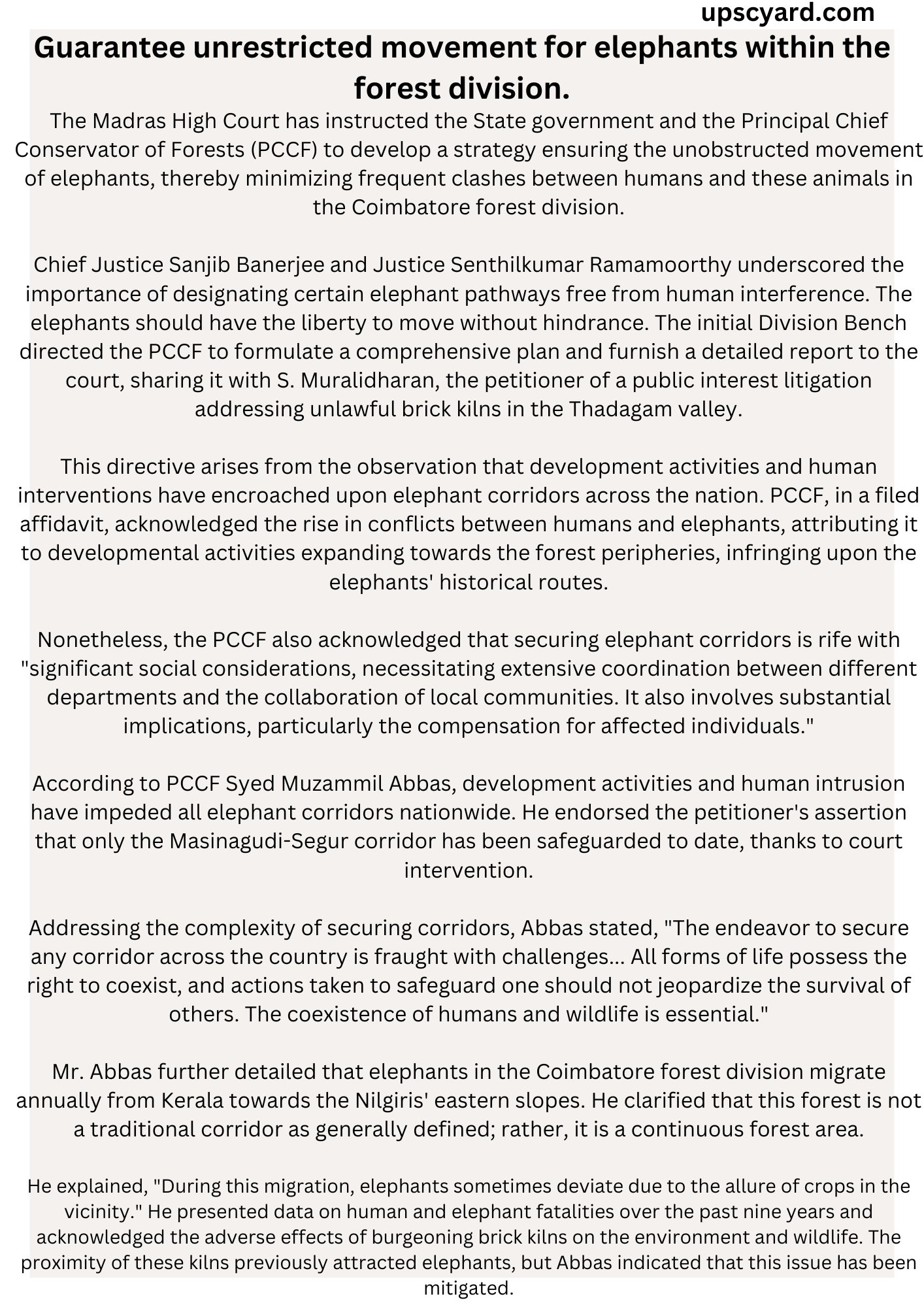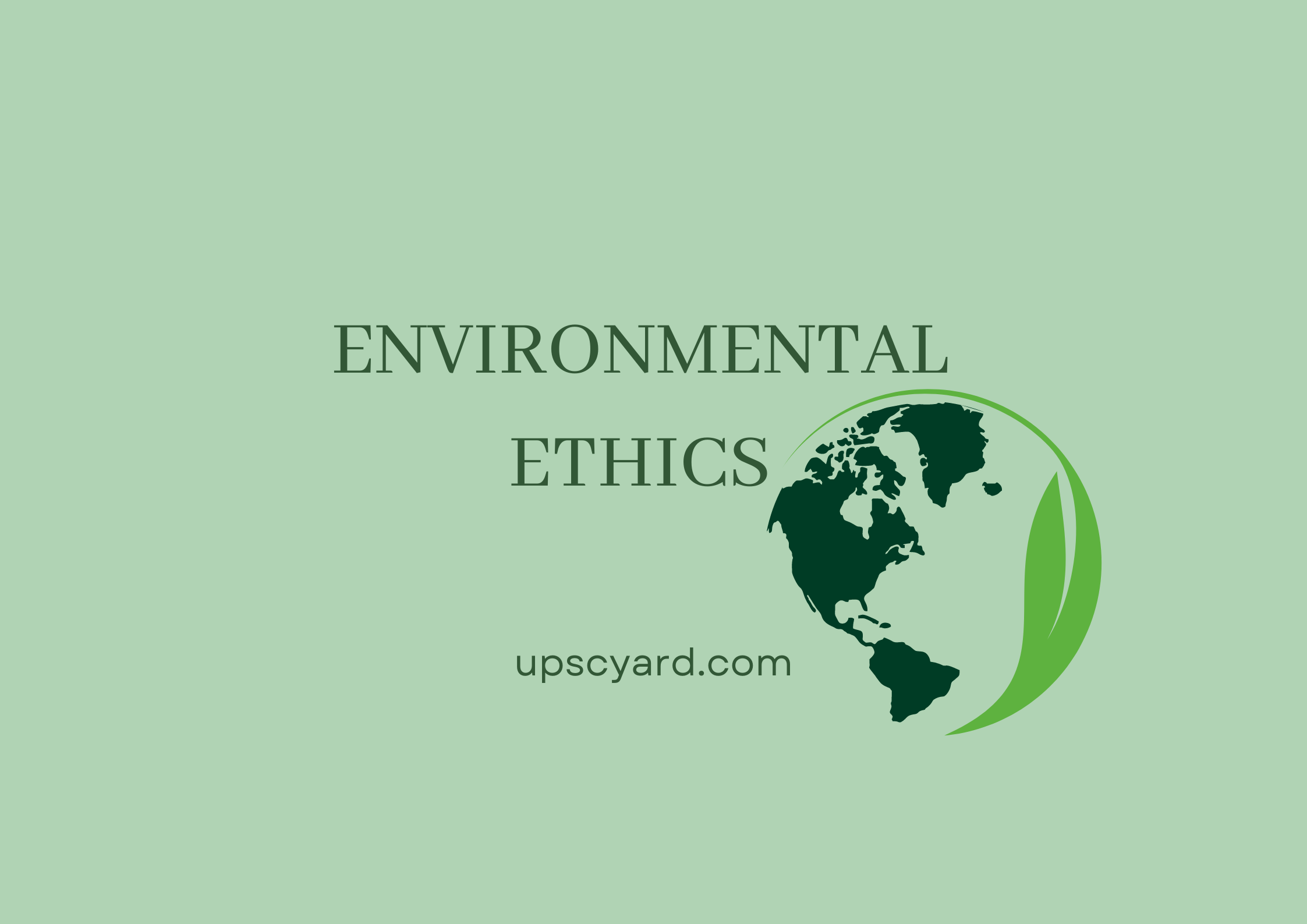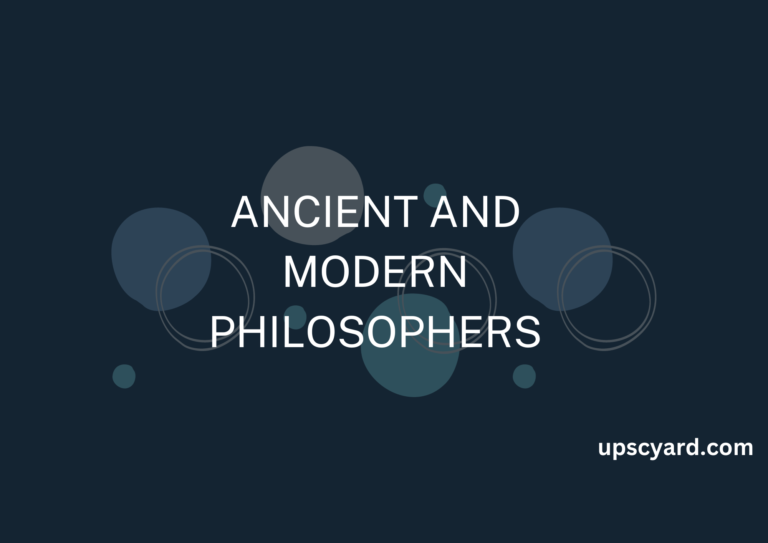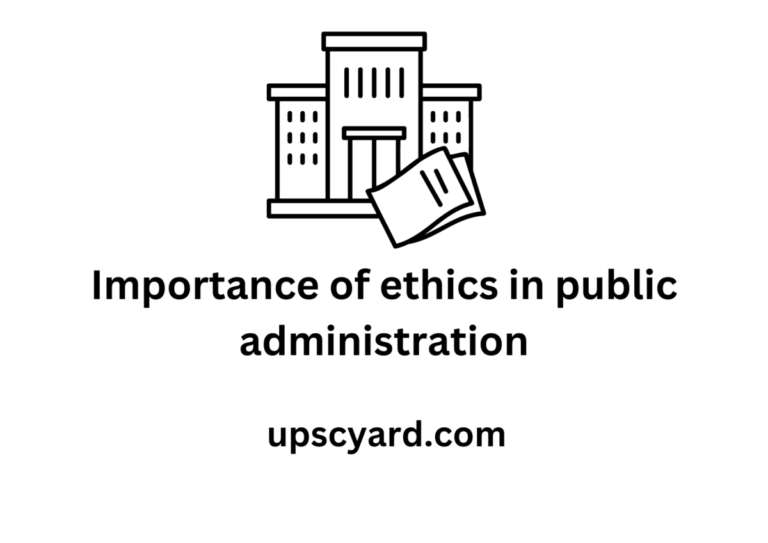Rabindranath Tagore held the belief that education must encompass the study of environmental ethics. But what precisely does environmental ethics entail? It is a unique area of inquiry that delves into the ways we should interact with and care for the environment, and it highlights its significance, particularly in our contemporary world.
Environmental Ethics
Environmental ethics revolves around humanity’s moral connection with the natural world. Although various philosophers have addressed this subject over time, environmental ethics evolved into a distinct philosophical field during the 1970s. The growing realization undoubtedly influenced this emergence in the 1960s of the environmental impacts caused by technology, industry, economic growth, and population expansion.
Development Vs. Environment

What necessitates Environmental Ethics?
The ever-changing nature of our world demands a thoughtful examination of the ethical implications that accompany these transformations, particularly due to the adverse effects of our modern technological society on the environment.
The progress in scientific knowledge has shed light on the ways human activities impact nature, revealing previously unknown consequences. This newfound understanding brings forth novel ethical dilemmas that necessitate our attention. The notion that our actions could have a global environmental impact was not widely recognized in the past.
Today, experts contend that deforestation and reliance on fossil fuels have contributed to elevated carbon dioxide levels, leading to climate changes that demand a united global response. This brings forth fresh moral quandaries that require careful consideration.
Certain advocates argue that the environment should be included in our ethical deliberations as a natural extension of our civilization. They advocate for acknowledging moral and legal rights for animals, trees, and even geological features, advocating for their respect and protection. These emerging concerns call for developing new ethical principles to address and uphold them effectively.
Principle of Polluter Pays
The foundational concept of “Polluter Pays” stipulates that individuals or entities responsible for environmental degradation should assume the financial burden of remedying the damage caused. This principle prioritizes accountability and equity, emphasizing that those who pollute must take responsibility for the adverse consequences they generate. To implement this principle, fines, penalties, or taxes are often imposed on polluters to offset the environmental harm they inflict. By internalizing the costs associated with pollution, the Polluter Pays principle aims to motivate polluters to adopt eco-friendly practices and foster a more sustainable approach to safeguarding the environment.
Extending Moral Standing
What responsibilities do we bear concerning the natural environment? If the response lies in that our survival depends on our responsible treatment of nature, then this ethical stance is referred to as “anthropocentric.” Anthropocentrism, denoting “human-centeredness,” centers on the idea that human well-being is pivotal in our environmental ethics.
Human Beings
Unsurprisingly, the natural environment has become a major concern due to its significant impact on human beings. Pollution, for instance, poses serious threats to our health and well-being, while resource depletion jeopardizes our standard of living. On the other hand, climate change poses risks to our homes, and the loss of biodiversity deprives us of potential medicinal sources. Furthermore, the vanishing wilderness robs us of a source of awe-inspiring beauty. In light of these connections, an anthropocentric ethic emerges, emphasizing our obligations to preserve and protect the environment for human well-being and prosperity.
The moral standing of future generations has gained attention because environmental problems, such as climate change and resource depletion, will significantly impact these future humans, more so than the present generation. This has led some philosophers to ground their environmental ethics on the obligations towards these upcoming generations (Gewirth, 2001). However, not all philosophers are convinced, as some argue that future individuals lie outside our moral community due to their inability to reciprocate (Golding, 1972).
Nevertheless, it is worth noting that even though the deceased cannot reciprocate, we still acknowledge our obligations to them, such as honoring their last wishes and executing their wills (Kavka, 1978). In the realm of ethics, we find ourselves entangled in a complex web of responsibilities and considerations concerning our relationship with the environment and our duty towards future generations.
Animals
Imagine you are out camping and unexpectedly come face-to-face with a bear. If you impulsively shoot it without any moral concern, some ethical viewpoints, like anthropocentrism, would claim that you have not done any wrong to the bear itself. However, a more human-friendly perspective might argue that such an action might still be wrong, considering how it affects others, like depriving other campers of a beautiful sight or behaving unvirtuously.
Now, let us delve into the criteria for moral standing. According to Singer, the key lies in sentience – the ability to feel pleasure and pain (Singer, 1974). On the other hand, some critics argue that animal liberation should not be considered a valid environmental ethic (Callicott, 1980; Sagoff, 1984).
However, for many environmentally conscious philosophers, this viewpoint is flawed. Instead, they prioritize the protection of endangered species (Rolston III, 1985). For them, safeguarding these creatures takes precedence, even if it challenges the anthropocentric perspective. Moral standing and considering sentient beings remain a fascinating subject of discussion and differing viewpoints within environmental ethics.
Individual Living Organisms
Let us delve into a human-friendly thought experiment called the “last-human scenario” proposed by some philosophers (Attfield, 1983, p. 155).
Imagine a situation after a catastrophic event where only one human being and the last tree of its species are left. In this scenario, if the individual decides to chop down the tree, no human or animal would be harmed since they have all perished. We can even take it further and say that no conscious being would suffer from the tree’s destruction.
Albert Schweitzer, an early philosopher, presented a powerful argument called the “Reverence for Life” ethic (Schweitzer, 1923). According to this ethic, all living things have a “will to live,” As humans, we should respect and preserve this will, refraining from interfering with or extinguishing it. Embracing such a perspective can lead us to a more compassionate and human-friendly approach towards the natural world.
Holistic Entities
Aldo Leopold has undeniably been the primary influence on “holistic” ethics advocates. His concept of the “land ethic” emphasizes that we must stop viewing land merely as an object or resource. According to Leopold, land is more than just soil; it is a dynamic energy source flowing through interconnected ecosystems of soils, plants, and animals. The energy circulates through food chains, ascending from the soil to sustain life, and then returns through death and decay, nourishing the land once again.
His statement can sum up Leopold’s ethical view, “A thing is right when it tends to preserve the integrity, stability, and beauty of the biotic community. It is wrong when it tends otherwise” (Leopold, 1949/1989 pp. 218-225). Embracing this “land ethic” promotes a human-friendly approach that values the interconnectedness and well-being of the entire biotic community, recognizing nature’s essential role in sustaining life and maintaining ecological harmony.
Radical Ecology
While the “radical ecology” movement encompasses diverse ideas and beliefs, it shares two core elements that set it apart from the ethical extensions mentioned earlier. Firstly, these radical ecologists assert that extending moral standing alone is inadequate to address the environmental crisis. They advocate for a more comprehensive philosophical outlook, urging fundamental shifts in our perception and understanding of reality.
Secondly, the radical ecologies go beyond the confines of ethics and delve into broader societal transformation. They call for profound changes in social structures and institutions. These ideologies have a pronounced political dimension, compelling us to confront the environmental crisis by redefining how we live and operate both as a society and as individuals. Embracing a human-friendly approach, the radical ecology movement seeks to foster a sustainable and harmonious coexistence with nature, transcending ethical boundaries to encompass significant social and political transformations.
Deep Ecology
The “radical ecology” movement encompasses a rich tapestry of ideas and beliefs, yet it stands apart from ethical extensionism with two distinctive features. Radical ecologists emphasize that extending moral standing alone cannot adequately address the environmental crisis. They advocate a profound philosophical shift, urging us to transform our perception and understanding of reality on a fundamental level.
Secondly, radical ecologies venture beyond ethics, extending their reach to broader societal transformation. They call for profound changes in social structures and institutions, highlighting the need to confront the environmental crisis through comprehensive shifts in our collective way of life. With a human-friendly approach, the radical ecology movement aims to foster sustainable and harmonious coexistence with nature, transcending traditional ethical boundaries to embrace substantial social and political transformations. We can navigate toward a more compassionate and ecologically conscious future by embracing these principles.
Social Ecology
Like deep ecology, social ecology identifies the root of the environmental crisis in the dominant ideology of modern Western societies. Thus, social ecology contends that a radical transformation of this prevailing ideology is imperative to address this crisis. However, unlike deep ecology’s focus on “self-realization,” social ecology aims to eliminate domination. The works of Murray Bookchin, a prominent social ecologist, revolve around domination.
Bookchin emphasizes that the hierarchies of power prevalent in modern societies have led to an unequal relationship between humans and the natural world. He argues that dismantling these power structures is essential for fostering harmony with nature (Bookchin, 1982).
Critics have pointed out a potential flaw in Bookchin’s theory. They argue that his social ecology may still hold traces of anthropocentrism, thus failing to acknowledge the environment’s intrinsic value. Some see anthropocentric tendencies in how Bookchin approaches the liberation of humans and nature.
The notion that humans possess complete knowledge of nature’s unfolding and can control it is deemed arrogant and unfounded (Eckersley, 1992, pp. 154-156). Instead, critics suggest embracing humility and acknowledging the inherent complexity of nature. By cultivating a more harmonious relationship with the environment, social ecology can evolve into a more inclusive and sustainable paradigm, fostering genuine respect for all living beings.
Ecofeminism
Like social ecology, ecofeminism also identifies a connection between social dominance and the subjugation of the natural world. However, ecofeminism encompasses diverse perspectives, with feminist writers on the environment offering various viewpoints. Here, we will explore three prominent positions.
Val Plumwood critiques the rationalism inherent in traditional ethics, attributing its rationalism to the oppression of women and nature. Plumwood argues that the problem lies in the promotion of dualisms by rationalism. For instance, reason is often juxtaposed against emotion. Traditional ethics favor reason, claiming it provides a stable foundation for moral arguments due to its impartiality and universality. Emotion, in contrast, is seen as lacking these attributes, leading to shaky ethical frameworks based on sentiment and affection.
However, Plumwood and other writers challenge the emphasis on women’s “naturalness” as it reinforces the very dualism that led to women’s oppression. Associating women with nature merely perpetuates their proximity to oppression, according to Plumwood.
Ecofeminism, exploring the interconnections between social and environmental domination, seeks to redefine ethical paradigms by recognizing the intrinsic value of both women and nature. By acknowledging the limitations of traditional rationalism and embracing a more inclusive approach that values emotion and interconnectedness, ecofeminism advocates for a human-friendly and ecologically sustainable world. It seeks to break free from oppressive dualisms, fostering harmony and equality for all beings within our interconnected web of life.
The Future of Environmental Ethics
There are indications of three potential future developments in environmental ethics. Firstly, environmental ethics will inevitably be influenced by changes in political endeavors to address environmental issues.
For instance, the Kyoto Protocol can be seen as the initial global attempt to tackle climate change. However, its effectiveness has been questioned due to limited participation from major polluters, modest reductions in greenhouse gas emissions, and countries struggling to meet their targets. As a result, many commentators consider it a failure.
Secondly, there might be an alignment between business ethics and environmental ethics. As consumers wield significant power, it could be in the best interest of large corporations to engage in environmental initiatives actively. This could lead to business ethics addressing similar issues that environmental ethics has addressed.
For example, global distributive justice becomes pertinent when considering the unequal impacts of climate change on people worldwide. Disparities arise concerning housing, sanitation, disease resistance, and livelihoods. In such cases, considerations of the environment are crucial in determining questions of justice.
In this human-friendly approach to environmental ethics, understanding the interconnectedness between political actions, business practices, and global distributive justice can pave the way for a more sustainable and equitable world. By embracing responsibility and ethical consideration of the environment, we can foster positive change and safeguard the well-being of all individuals and the planet.
The debate between Environmental Degradation and Economic Development
The ongoing discussion revolves around the core principles of Utilitarianism.
The discourse on environmental degradation and economic development seeks to strike a harmonious equilibrium between advancing economic prosperity and safeguarding the environment. Economic development is driven by the ambition to elevate living standards and generate employment opportunities. Conversely, environmental degradation signifies the detrimental consequences of human activities on the natural world.
Economic development proponents contend it is key to alleviating poverty, enhancing infrastructure, and fostering overall welfare. They assert that economic growth can usher in technological progress and innovations that solve environmental challenges. Consequently, they prioritize economic expansion, occasionally relegating environmental concerns to a secondary position.
Environmentalists, however, emphasize preserving ecosystems, biodiversity, and natural resources for a sustainable tomorrow. They caution against unchecked economic growth, which may harm the environment and, in turn, affect human well-being. They advocate for a balanced approach and champion sustainable development that considers economic growth and environmental conservation.
In this human-friendly perspective, the debate calls for thoughtful deliberation, recognizing the intrinsic interconnectedness between economic prosperity and ecological preservation. The goal is to forge a path that fosters collective welfare for humanity and the environment, steering us toward a flourishing and sustainable future.
Conclusion
Environmental ethics is pivotal in instilling a sense of duty and awareness among individuals regarding their relationship with nature. It fosters humility, prompting people to recognize their impact on the environment and encouraging actions to rectify environmental imbalances, no matter how small.
Through its moral compass, environmental ethics offers guidance on using nature responsibly, discouraging practices that lead to the degradation and depletion of natural resources. It underscores the significance of adopting sustainable approaches and becoming conscientious stewards of the environment.
Ultimately, environmental ethics acts as a powerful advocate against animal cruelty. It champions the creation of harmonious and captivating living spaces while contributing to the preservation of ecological equilibrium. Embracing this human-friendly perspective, environmental ethics emerges as a vital force, uniting individuals in a collective endeavor to safeguard our planet and ensure a thriving coexistence with the natural world.




